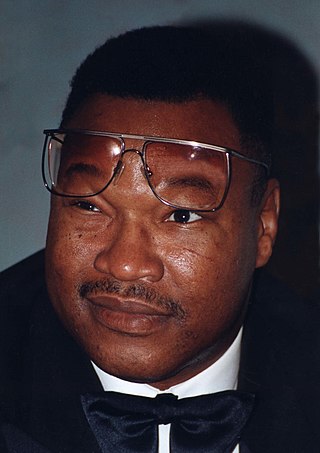
Larry Holmes is an American former professional boxer who competed from 1973 to 2002 and was world heavyweight champion from 1978 until 1985. He is often considered to be one of the greatest heavyweight boxers of all time. He grew up in Easton, Pennsylvania, which led to his boxing nickname of the "Easton Assassin".

Kenneth Howard Norton Sr. was an American professional boxer who competed from 1967 to 1981. He was awarded the WBC world heavyweight championship in 1978, after winning a close split decision over Jimmy Young in a title eliminator bout, after which Leon Spinks refused to fight with him.
Gerhardus Christian Coetzee OIB was a South African professional boxer who competed from 1974 to 1986, and in 1993 and 1997. He was the first African in history to ever fight for, and win, a world heavyweight championship, having held the WBA title from 1983 to 1984. He held notable knockout wins against WBA world heavyweight champion Michael Dokes and undisputed world heavyweight champion Leon Spinks, as well as a draw with future WBC world heavyweight champion Pinklon Thomas and wins over top contenders Ron Stander, Scott LeDoux and James Tillis.

Leon Spinks was an American professional boxer who competed from 1977 to 1995. In only his eighth professional fight, he won the undisputed heavyweight championship in 1978 after defeating Muhammad Ali in a split decision, in what is considered one of the biggest upsets in boxing history. Spinks was later stripped of the WBC title for facing Ali in an unapproved rematch seven months later, which he lost by a unanimous decision.
Jimmy Young was an American heavyweight professional boxer. Young was known for his awkward, defensive style and counterpunching. He was one of the top contenders of the 1970s, most notably earning a victory over George Foreman in 1977 and losing a controversial unanimous decision against Muhammad Ali in 1976. Young fought many other significant fighters of his era, including twice outpointing Ron Lyle and losing only by a split decision to then-number one contender Ken Norton in a title eliminator in late 1977. A fellow boxer, Bobby Watts, was his cousin.

Earnie Dee Shaver, best known as Earnie Shavers, was an American professional boxer who competed between 1969 and 1995. A two-time world heavyweight championship challenger, he is known as one of the hardest punchers in heavyweight boxing history. He scored 70 knockout wins, including 23 in the first round, for a 76.7% overall knockout rate.
During the 1970s, boxing was characterized by dominating champions and history-making rivalries. The decade had many superstars, who also had fierce rivals. Alexis Argüello, for example, who won the world Featherweight and Jr. Lightweight titles in the '70s, had to overcome Alfredo Escalera twice before the decade was over.

Mike Tyson vs. Michael Spinks, billed as Once and For All, was a professional boxing match which took place on June 27, 1988. Both fighters were undefeated and each had a claim to being the legitimate heavyweight champion. At the time, Tyson held the belts of all three of the major sanctioning organizations while Spinks was The Ring and Lineal champion, regarded as "The People's Champion," and was considered the lineal champion. The fight was held at the Convention Hall, Atlantic City, New Jersey U.S., it was at the time the richest fight in boxing history, grossing some $70 million, of which Tyson earned a record purse of around $22 million and Spinks $13.5 million. Tyson won the fight, knocking out Spinks in 91 seconds.
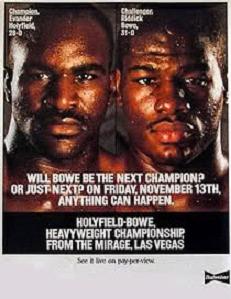
Evander Holyfield vs. Riddick Bowe was a professional boxing match that took place on November 13, 1992 in Las Vegas, Nevada. The fight was contested for the undisputed world heavyweight championship, which consisted of the WBA, WBC, and IBF championships.

Riddick Bowe vs. Evander Holyfield II, billed as Repeat or Revenge, was a professional boxing match that took place on November 6, 1993, for the WBA and IBF heavyweight championships.
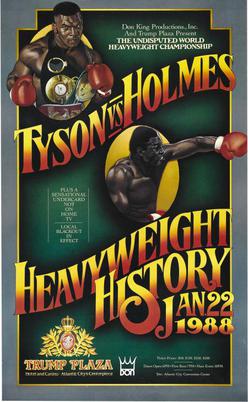
Mike Tyson vs. Larry Holmes, billed as Heavyweight History, was a professional boxing match contested on January 22, 1988, for the WBA, WBC and IBF Heavyweight Championships.

Evander Holyfield vs. Larry Holmes, billed as "Class of Champions", was a professional boxing match contested on June 19, 1992, for the undisputed heavyweight championship.
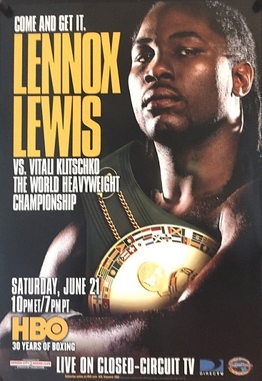
Lennox Lewis vs. Vitali Klitschko, billed as Battle of the Titans, was a heavyweight professional boxing match contested between WBC, IBO, and The Ring champion Lennox Lewis and former WBO titleholder Vitali Klitschko. The bout took place on June 21, 2003 at the Staples Center in Los Angeles, California. Lewis defeated Klitschko via sixth-round technical knockout (TKO) after the fight was stopped due to a severe cut above Klitschko's left eye. It was the last fight of Lewis' career, having decided to retire after eventually rejecting a rematch.

Lennox Lewis vs. Lionel Butler was a professional boxing match contested on May 13, 1995. The fight was a WBC "eliminator" bout with the winner scheduled to become the number one contender for the WBC heavyweight title.

George Foreman vs. Gerry Cooney, billed as The Preacher and the Puncher, was a professional boxing match contested on January 15, 1990.
Muhammad Ali vs. Leon Spinks was a professional boxing match contested on February 15, 1978, in Las Vegas, Nevada, for the WBA, WBC, and The Ring heavyweight championship.
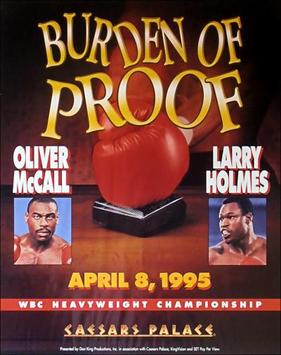
Oliver McCall vs. Larry Holmes, billed as "Burden of Proof", was a professional boxing match contested on April 8, 1995 for the WBC Heavyweight Championship. The undercard included world championship bouts in four other categories.

Leon Spinks vs. Muhammad Ali II,, billed as Battle of New Orleans, was a professional boxing match contested on September 15, 1978, in New Orleans for the WBA and The Ring heavyweight championships.
The heavyweight unification series, also known as the Heavyweight World Series, was a sequence of professional boxing matches held in 1986 and 1987 to crown an undisputed champion of the heavyweight class. The series was produced by HBO Sports and promoted by Don King. It ended with Mike Tyson as undisputed champion, holding the championship belts of the International Boxing Federation (IBF), World Boxing Association (WBA), and World Boxing Council (WBC).

Larry Holmes vs. Leon Spinks, billed as A Tribute to Joe Louis was a professional boxing match contested on June 12, 1981, for the WBC heavyweight title.















